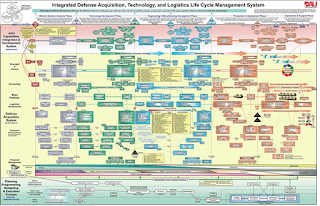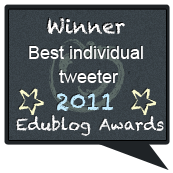Perhaps you are like me and have to sit through presentations often. Sometimes they are great. You can tell the presenter put a lot of thought into what they want to talk about and it feels like they really know their stuff. The slides they use are engaging and help reinforce the story that’s being told.
But then there are those times that are the complete opposite...
The presentation seems disjointed and incomplete. The design of the slides leaves a lot to be desired. Maybe the spinning transition is just too much or the typewriter sound every time a new bullet appears is over board.
Or maybe the slides look like these...
A lot of the work I do has me creating presentations several times a week. I am far from perfect and actually spend a lot of time reflecting on each presentation I give trying to make sure I keep evolving what I do and to ensure the story I am trying to tell matches with the expectations of my audience.
There are some great resources to make your (or your students’) presentations really pop. Here are just a few of my favorites.
Presentation Zen-One of the first books I bought after I started doing presentations regularly was this one by Garr Reynolds. It is full of ideas for preparing, designing and delivering the best presentations ever. His site too has lots of suggestions like how to get to know your audience, the best way to outline a presentation, design ideas and tips for the perfect delivery. This is a resource I use all the time.
The TED Commandments-It you look at a previous post all about using TED Talks in the Classroom there are some common themes in the videos even though they are all different. Anyone that gives a TED Talk is strongly encouraged to follow the TED Commandments of giving a good talk. Mostly funny, they do encourage presenters to make sure they tell a story, focus on their curiosity and passion, and never read their talk among other things. These are great rules to follow for any presentation.
SlidesCarnival-One of my new favorite presentation tools isn’t really a tool at all. SlidesCarnival is a collection of some really awesome templates that you can use in Google Docs or PowerPoint. The template you choose for your presentation can really help to frame your conversation and make an impact. These templates are unlike anything you’ve probably seen. Very well designed, the templates come with lots of suggestions for design and even their own icons to use to callout elements in your talk. Best part they are all free!
The Noun Project-Speaking of icons, sometimes you need to find just the right one to fill out the design of your slides. The Noun Project has you covered. With 1000’s to choose from, pick the one you want to use and use it. Some come with a Creative Commons license (more on that in a minute) and many more are just free to use how you want. It the Noun Project doesn’t have it, it doesn’t exist!
Creative Commons License-One of the best things any presenter and educator can do is allow others to use their work freely and build upon it so others can share in the knowledge. The Creative Commons Licenses allow for just that. But answering a few easy questions you can license your work so others can use it.
But then there are those times that are the complete opposite...
The presentation seems disjointed and incomplete. The design of the slides leaves a lot to be desired. Maybe the spinning transition is just too much or the typewriter sound every time a new bullet appears is over board.
Or maybe the slides look like these...
A lot of the work I do has me creating presentations several times a week. I am far from perfect and actually spend a lot of time reflecting on each presentation I give trying to make sure I keep evolving what I do and to ensure the story I am trying to tell matches with the expectations of my audience.
There are some great resources to make your (or your students’) presentations really pop. Here are just a few of my favorites.
Presentation Zen-One of the first books I bought after I started doing presentations regularly was this one by Garr Reynolds. It is full of ideas for preparing, designing and delivering the best presentations ever. His site too has lots of suggestions like how to get to know your audience, the best way to outline a presentation, design ideas and tips for the perfect delivery. This is a resource I use all the time.
The TED Commandments-It you look at a previous post all about using TED Talks in the Classroom there are some common themes in the videos even though they are all different. Anyone that gives a TED Talk is strongly encouraged to follow the TED Commandments of giving a good talk. Mostly funny, they do encourage presenters to make sure they tell a story, focus on their curiosity and passion, and never read their talk among other things. These are great rules to follow for any presentation.
SlidesCarnival-One of my new favorite presentation tools isn’t really a tool at all. SlidesCarnival is a collection of some really awesome templates that you can use in Google Docs or PowerPoint. The template you choose for your presentation can really help to frame your conversation and make an impact. These templates are unlike anything you’ve probably seen. Very well designed, the templates come with lots of suggestions for design and even their own icons to use to callout elements in your talk. Best part they are all free!
The Noun Project-Speaking of icons, sometimes you need to find just the right one to fill out the design of your slides. The Noun Project has you covered. With 1000’s to choose from, pick the one you want to use and use it. Some come with a Creative Commons license (more on that in a minute) and many more are just free to use how you want. It the Noun Project doesn’t have it, it doesn’t exist!
Creative Commons License-One of the best things any presenter and educator can do is allow others to use their work freely and build upon it so others can share in the knowledge. The Creative Commons Licenses allow for just that. But answering a few easy questions you can license your work so others can use it.










